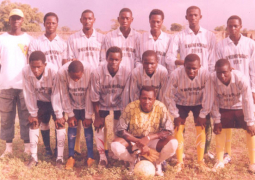Any person who happens to fast during the whole month of Ramadan then has fast the Lailatulkhari, and fasting it means all the sins, which that person might commit over the past years, shall be forgiven by Allah.
This was why the prophet told the Sahabas (apostles) that anyone who does a good thing which is not compulsory on him or her in Ramadan shall be rewarded, and if that thing the person does in Ramadan is compulsory, it shall be rewarded 70 times.
Any person who gives food, even as small as one orange, apple or a cup of tea to a person to break the fast with, will be rewarded just like the person who fasted, and any person who gives a cup of water to a person who is fasting to break his/her fast with, you will drink in kawsara.
Mufti Menk: As Muslims, both men and women, we are suppose to be preparing ourselves during the month of Ramadan, and we are suppose to know that Allah has kept this beautiful month for us.
Ramadan is a beautiful month that Allah has blessed us with every year.
Although we are not supposed to be eating in the month of Ramadan, we have lots of food stored in our fridge in the month of Ramadan.
The food that we have in the evenings tastes much better than the same food that we eat before or after the month of Ramadan.
The blessings of the month begin when we cited the moon or when the month was announced, automatically you feel the blessings of the month.
But none of us has the guarantee that we are going to witness the month, and so many of us have witness previous months of Ramadan in our lives and our lives have not change.
Maybe in Ramadan we became holy, pious, noble and perform our salat in Ramadan on time, but when Ramadan goes - some of us do hijab and the minute Ramadan goes the hijab is out.
If we want to benefit from the beautiful month of Ramadan that we are in, let us understand that it is the month of fasting, discipline, Taqwa, Quran, and developing the link with Allah (SWT).
It is also for repentance, making resolutions so that we can live the rest of the eleven months of the year in a way that will please Allah.
Sometimes many of us complete the Quran in the month of Ramadan, and we said we read one Quran in the month of Ramadan.
What did you do outside the month of Ramadan? What did you do to the Quran? Is it on your bookshelf collecting dust? Start reading the Quran before the month of Ramadan, and continue with it in the month of Ramadan.
Aja Maimuna Savage: Women are part of creation. When Allah created man, he created woman out of man meaning he created men and women, and both of them were asked to serve Allah.
The role of a woman during Ramadan is no difference from that of a man, because the main purpose is for the woman to serve Allah.
During the month of Ramadan, the role of a woman is to fast from sunrise to sunset, abstaining from water, other drinks and from having intercourse with a man.
Every woman must fast, but in case of menstruation or childbirth, the woman should not fast even if she wants to fast.
The woman that is pregnant, and is advised by the doctor not to fast, should not fast.
A breastfeeding mother - and she needs enough milk for her child - must not fast, but she is not free from it; she will pay a day for a day in later days when she is able to do so.
She-she-she: She-she-she welcomes our dear readers in this holy month of Ramadan. It has been 7 days now since the holy month started in The Gambia, and the women are doing their part as usual.
The women, ladies and girls in the country have welcomes the holy month with a dress code that is appreciated by our dear religion, Islam.
Women, girls dress beautifully from head to toe, covering their entire body, showing their respect for the holy month of Ramadan.
The question that our honourable Islamic scholars are asking is why that behaviour can’t continue, even after the holy month of Ramadan?
Why can’t women cover up their body, put on the hijab even after Ramadan because, according to Islamic scholars, Ramadan does go away, but Allah stays and Allah is the one we worship?
We have seen women from all walks of life struggling to close from work earlier to go home, and be with their families or cook for their families during this holy month.
Even those women that are not working also take care of the family, as well as cook for them.
A woman in her matrimonial home wishes for nothing more than cooking the best food for her husband and children, during the holy month of Ramadan; and the least that men could do is to accept foods cooked by their wives rather than complaining of how the food was cooked.
Fasting and cooking at the same time is a huge responsibility, and men who cook can tell how it is like.
Ramadan is, no doubt, a month filled with blessings, but it is also a month where people who are not well off suffer a lot in the hands of those who sell food commodities in our markets.
It is a holy month, not a month of making profits; so the women gardeners should help their fellow women in terms of pricing of the goods or foodstuff that mostly comes from our women gardeners, because it is also a month of sharing and caring.
Some of us cook more than three different meals in a day during this month, when a neighbour somewhere, not very far from us, barely has one meal in a day.
Since the women are the ones in charge of food in our homes, and the scholars have advised that during the month the rich should reach out to the poor, why not we share our food with our neighbours?
When it comes to worshipping our creator, there is nothing like gender because Ramadan is all about worshipping Allah.
If men can recite the holy Quran in this holy month, women who are learned in the Quran can also recite the holy Quran, and those women who are not well versed in the Quran can listen to those women reciting it.
If men can use prayer beads and chant the name of Allah, women can also do the same.
The Tarawi or “Nafillah” is for men and women, as well as children so women should not feel lazy and leave it to men.
According to Mufti Menk, Ramadan is a month where we develop a link between the creator and us, and also map out resolutions that we can live with even after the month of Ramadan.
We all know the significant role played by women in the homes and in the lives of their children. Women can also cultivate the habit of worship in the minds and behaviour of their children during this holy month, as well as draw them closer to their creator so that they can be useful to the society in the future.
EndFragmentRead Other Articles In Article (Archive)




